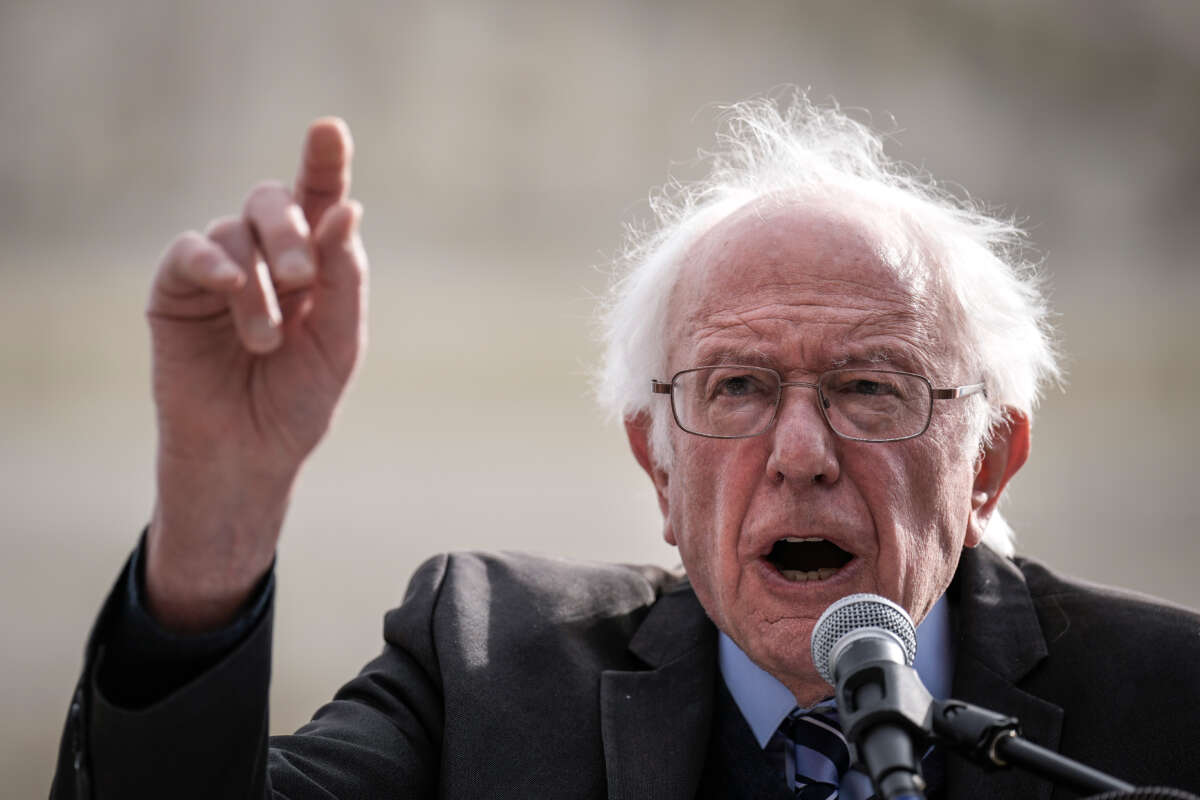Truthout is a vital news source and a living history of political struggle. If you think our work is valuable, support us with a donation of any size.
After a third major pharmaceutical company in as many weeks announced that it is joining the wave of price cuts for insulin products on Thursday, Sen. Bernie Sanders (I-Vermont) said that the current momentum must not be wasted and that the movement for price cuts should be spread to prescription drugs across the board.
Sanofi is the latest to jump on the public relations trend, announcing that it is capping the out-of-pocket cost for its most popular insulin, Lantus, at $35 a month for those with private insurance. The company offers an assistance program that could also allow people without insurance to access the $35 price, though patient assistance programs are notoriously difficult to utilize.
Sanofi joins Eli Lilly and Novo Nordisk in lowering its insulin prices this month, likely looking to continue to offer competitive prices while also scoring a public relations win. It comes at a time of high scrutiny over insulin prices and after Democrats in Congress passed a bill last year that would cap insulin prices at $35 a month for Medicare recipients.
As political commentators have pointed out, though the insulin price drops will likely lead to savings for the millions of Americans who rely on the drug to survive, the announcements are also strategically placed to allow the pharmaceutical companies to profit from the price cuts.
As The Los Angeles Times’s Michael Hiltzik wrote in a column on Friday, Eli Lilly’s shares have risen by nearly 6 percent since it announced its version of the $35 out-of-pocket insulin price cap on March 1. And, a recent report found that, because of complexities with Medicaid’s rebate formula, the company will actually make an estimated $85 million more under the new $35 federal price cap policy, a report by consulting firm Veda Partners recently found.
Further, because pharmaceutical companies typically raise prices of prescription drugs by huge margins each year, the supposed lowered price for Eli Lilly’s insulin product Humalog will only bring it back to what it originally cost when it was first put on the market. Back when Humalog was launched in 1996, Hiltzik pointed out, it cost only $21 a vial — or $40 adjusted to inflation. Meanwhile, the list price for Humalog will remain at around $66, Veda estimated, down from the current list price of $275, so it will still be more expensive than it was when it was first introduced.
While not quite as altruistic as they seem, the cuts will still likely offer relief to many Americans in a time when over a million Americans are reporting having to ration insulin due to the cost.
Sanders, who recently introduced a bill to “finish the job” and cap insulin at $20 a vial across the country, wrote that the price reductions must spread to the rest of the prescription drug market, noting that prescription drug costs are higher in the U.S. than they are in the rest of the world.
“It’s official. As a result of a strong grassroots movement Sanofi has become the third company to substantially lower the price of insulin,” Sanders tweeted on Friday. “We are making progress but more must be done. Americans must no longer pay the highest prices in the world for prescription drugs.”
An analysis by Public Citizen from 2021 found that, for 20 top-selling drugs, the pharmaceutical industry makes more in sales to the U.S. than it does in sales to every other country in the world combined. Meanwhile, the Government Accountability Office found in another report in 2021 that some drugs are as much as 10 times more expensive in the U.S. than they are in comparably wealthy countries.
Democrats and progressives like Sanders have been working to lower prescription drug prices over the past years, but have faced staunch resistance from Big Pharma-funded Republicans and conservative Democrats like Sen. Kyrsten Sinema (Arizona), who now lists herself as an independent.
High drug prices combined with the fact that the U.S. is the only wealthy country without universal health care have made the U.S. a global outlier on health spending and outcomes.
An analysis by the Commonwealth Fund released earlier this year found that, among wealthy countries, the U.S. spends by far the highest portion of its gross domestic product (GDP) on health care while also having by far the worst health outcomes overall, as measured by factors like life expectancy, avoidable deaths, parental and infant mortality and gun violence.
A terrifying moment. We appeal for your support.
In the last weeks, we have witnessed an authoritarian assault on communities in Minnesota and across the nation.
The need for truthful, grassroots reporting is urgent at this cataclysmic historical moment. Yet, Trump-aligned billionaires and other allies have taken over many legacy media outlets — the culmination of a decades-long campaign to place control of the narrative into the hands of the political right.
We refuse to let Trump’s blatant propaganda machine go unchecked. Untethered to corporate ownership or advertisers, Truthout remains fearless in our reporting and our determination to use journalism as a tool for justice.
But we need your help just to fund our basic expenses. Over 80 percent of Truthout’s funding comes from small individual donations from our community of readers, and over a third of our total budget is supported by recurring monthly donors.
Truthout has launched a fundraiser, and we have a goal to add 182 new monthly donors in the next 24 hours. Whether you can make a small monthly donation or a larger one-time gift, Truthout only works with your support.
